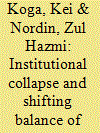|
|
|
Sort Order |
|
|
|
Items / Page
|
|
|
|
|
|
|
| Srl | Item |
| 1 |
ID:
174738


|
|
|
|
|
| Summary/Abstract |
This article examines the causal process of the institutional collapse of the Asia Pacific Council (ASPAC) in 1973 by focusing on Malaysia’s foreign policy behavior, and highlights implications for today’s ASEAN. Specifically, it argues that the institutional collapse of ASPAC was caused by Malaysia’s withdrawal, which stemmed from a shift in its balance of ontological security from security dependence on the UK and the West to greater political autonomy in Southeast Asia. This occurred after a change in the regional distribution of power caused by the UKs withdrawal from East of Suez, and to a lesser extent, US disengagement from Southeast Asia. In the 1960s and 1970s, Malaysia demonstrated the conflicting duality of ontological security, consisting of strategic and aspirational identities. Malaysia’s strategic identity was its association with the West, particularly the UK, which was nurtured through Malaysia’s routinized strategic interaction with them in the security realm. This identity prevented Malaysia from easily or completely abandoning its security ties with them, even when the strategic benefit was significantly marginal. On the other hand, Malaysia’s aspirational identity was to attain greater political autonomy without external interventions, particularly from great powers, which Malaysia experienced during its colonial period. Such sentiments emerged at the end of World War II and the following decolonization process, and were partly illustrated by Malaysia’s pursuit of the non-aligned movement.
|
|
|
|
|
|
|
|
|
|
|
|
|
|
|
|
| 2 |
ID:
132078


|
|
|
|
|
| Publication |
2014.
|
| Summary/Abstract |
In developing countries, separation of powers coexists with corruption by the ruling elite. This can be attributed to informal institutions, which counter the formal checks and balances. We demonstrate, by studying the Adarsh scam, the vulnerabilities of checks and balances. Fourteen actors belonging to different tiers of the Indian federal setup who could have vetoed the project or certain permissions failed to do so.We find that 54 percent of the checks collapsed because of quid pro quo, 21 percent due to being overridden, 4 percent due to misrepresentation, 7 percent due to absorption, and 14 percent due to omissions in the process.
|
|
|
|
|
|
|
|
|
|
|
|
|
|
|
|
|
|
|
|
|